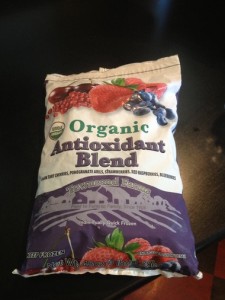Townsend Farms of Oregon has ordered a recall of a frozen berry product linked to a Hepatitis A outbreak in five Western states that has now sickened at least 34 people.
Lynne Terry of The Oregonian reports that Townsend Farms sold 332,000 packages of its Organic Antioxidant Blend through Costco stores nationwide. It also shipped to an East Coast chain, Harris Teeter, which sold the product under its own label.
So far, 34 people in Arizona, California, Colorado, New Mexico and Nevada have been infected in the outbreak. Hepatitis A, which attacks the liver, can be  prevented with a vaccine within two weeks of exposure. Immune globulin shots can also prevent or stem the severity of the disease.
prevented with a vaccine within two weeks of exposure. Immune globulin shots can also prevent or stem the severity of the disease.
Health officials expect more cases: The virus can incubate in the body for up to 50 days before symptoms appear. They include fever, loss of appetite, vomiting, diarrhea, nausea and fatigue.
Costco sold the potentially contaminated berries from February through May in 3 lb. bags. They have sequential best-by codes from T012415 through T053115. Distribution in Harris Teeter stores was limited to April 19 to May 7. Harris Teeter Organic Antioxidant Berry Blend was sold in 10 oz. bags with best by codes of T041615E and T041615C.
Costco pulled the product from its shelves on Wednesday and Thursday, said Craig Wilson, the company’s food safety manager. He said members who purchased the product got a call on Thursday and again this weekend. But one man who purchased the blend said he was not contacted.
State and federal officials suspect the outbreak was caused by pomegranate seeds from Turkey, not the berries in the mix.
Food and Drug Administration officials are investigating Townsend Farms’ processing plant in Fairview, where the blend was manufactured. Bill Gaar, the company’s attorney, said the FDA started the testing process on Monday by collecting samples.
Gaar said there was no indication that the blend was contaminated by pickers, food handlers or during processing. Besides the pomegranate seeds from Turkey, the blend contained cherries, blueberries, raspberries and strawberries from Oregon, Washington, Argentina and Chile.
The source of the fruit helped epidemiologists pinpoint the likely culprit. The strain of hepatitis A in the outbreak is not found in North or South America but is relatively common in North Africa and Middle East, according to the Centers for Disease Control and Prevention.
Last April, eight people were infected in British Columbia in a hepatitis A outbreak associated with frozen berries, and again this spring, more than 70 people developed the liver disease in Denmark, Norway, Sweden and Finland in a hepatitis A outbreak traced to frozen berries. Scandinavian officials suspect pomegranate seeds from Egypt in the Nordic outbreak. And also this spring, 15 people from Germany Poland and the Netherlands became infected with hepatitis A after eating frozen berries in Italy.
